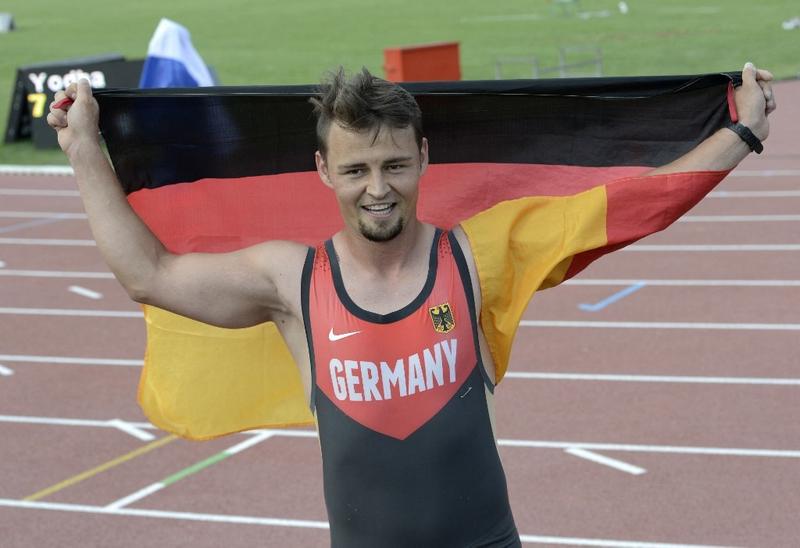 German athlete Heinrich Popow holds the German national flag after winning the men's 100 m T42 final on July 26, 2013 during of the IPC Athletics World Championships at the Rhone Stadium in Venissieux, near Lyon. (PHOTO /AFP)
German athlete Heinrich Popow holds the German national flag after winning the men's 100 m T42 final on July 26, 2013 during of the IPC Athletics World Championships at the Rhone Stadium in Venissieux, near Lyon. (PHOTO /AFP)
German Paralympic athletics great Heinrich Popow hopes the athletes competing at the Beijing Winter Paralympics can show the world how the Games transcend sports by pushing beyond their limits.
Heinrich Popow sprinted to a silver medal in a men's 100m race at the 2008 Beijing Paralympic Games, a 100m gold at London 2012 and long jump gold at Rio 2016
Popow sprinted to a silver medal in a men's 100m race at the 2008 Beijing Paralympic Games, a 100m gold at London 2012 and long jump gold at Rio 2016.
He described his experience at the 2008 Beijing Paralympics as "incredible".
ALSO READ: Liu wins Para biathlon men's middle distance sitting gold
"I was one of the youngest competitors and the crowd was cheering and everyone was so happy for me," he told Xinhua in a recent interview.
"After my race it took me six hours to leave the stadium because everyone wanted to have pictures and autographs. They were talking with me and celebrating my success with me. That was quite nice."
Popow told Xinhua that the beauty of sports is the ability to go beyond one's limits.
"Through sports I started to accept my disability. I started to prove to society that I'm capable of the goals I have," he said.
"I never feel disabled when I do sport. So I think that is psychological treatment."
Popow now works as an orthotic and prosthetic professional with German company Ottobock, which is operating repair centers for para athletes' equipment at the Beijing Winter Paralympics.
He returned to Beijing before the start of the Winter Paralympics to set up the on-site support for athletes.
ALSO READ: A 'super cool' love story
In his current job, Popow says he needs to solve real problems that he and other people with disabilities face. The company's expert engineers then find solutions to improve the quality of sport and life for people with disabilities.
Popow believes that many people underestimate just how tough it is to compete in para sports. "Using a prosthetic limb or wheelchair in everyday life uses seven times more energy than a person without disabilities. It's a sport in itself," he said.
Over the years, Popow has always been committed to promoting sports for people with disabilities. He has been teaching people with disabilities the skills and joy of sport by running workshops in various parts of the world.
"Beijing was my first workshop stop in China," Popow said.
"There were more than 100 applicants for the running program. We showed some school children that with the help of a running prosthesis everything is possible."
ALSO READ: Setting the stage for success
In the future, Popow said he wants to use digital technology to get more people with disabilities involved in sports. "We are creating an online community platform called 'MOVAO' where all people who have experienced amputation can come together to support each other and share problems and solutions," he said.
"I just want to raise the voice of people with disabilities."


